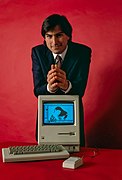Portal:Internet
The Internet PortalSelected article
Wikipedia is a multilingual, open content, free encyclopedia project operated by the non-profit Wikimedia Foundation. Its name is a portmanteau of the words wiki (a type of collaborative website) and encyclopedia. Launched in 2001, it is the largest, fastest growing and most popular general reference work currently available on the Internet. As of December 2007, Wikipedia had approximately 9 ¼ million articles in 253 languages, comprising a combined total of over 1.41 billion words for all Wikipedias. The English Wikipedia edition passed the 2,000,000 article mark on September 9, 2007. Wikipedia's articles have been written collaboratively by volunteers around the world and the vast majority of them can be edited by anyone with access to the Internet. Critics have questioned Wikipedia's reliability and accuracy, citing its open nature. The criticism is centered on its susceptibility to vandalism, such as the insertion of profanities or random letters into articles, and the addition of spurious or unverified information; uneven quality, systemic bias and inconsistencies; and for favoring consensus over credentials in its editorial process. Scholarly work suggests that vandalism is generally short-lived. When Time Magazine recognized "You" as their Person of the Year 2006, Wikipedia was the first particular "Web 2.0" service mentioned, followed by YouTube and MySpace.
Selected pictureA portmanteau of emotion (or emote) and icon, an emoticon is a symbol or combination of symbols used to convey emotional content in written or message form. News
Wikinews Internet portal
WikiProjects
Did you know (auto-generated) -
Selected biography
Joseph Carl Robnett Licklider (March 11, 1915 – June 26, 1990), known simply as J.C.R. or "Lick" was an American computer scientist, considered one of the most important figures in computer science and general computing history. After early work in psychoacoustics, he became interested in information technology early in his career. Much like Vannevar Bush, J.C.R. Licklider's contribution to the development of the Internet consists of ideas, not inventions. He foresaw the need for networked computers with easy user interfaces. His ideas foretold of graphical computing, point-and-click interfaces, digital libraries, e-commerce, online banking, and software that would exist on a network and migrate wherever it was needed. Licklider was instrumental in conceiving, funding and managing the research that led to modern personal computers and the Internet. His seminal paper on Man-Computer Symbiosis foreshadowed interactive computing, and he went on to fund early efforts in time-sharing and application development, most notably the work of Douglas Engelbart, who founded the Augmentation Research Center at Stanford Research Institute and created the famous On-Line System. He played a similar role in conceiving of and funding early networking research, most notably the ARPAnet.
General images -The following are images from various internet-related articles on Wikipedia.
Selected quoteMore Did you know...
Main topics
Featured contentCategoriesRelated portalsThings you can do
Associated WikimediaThe following Wikimedia Foundation sister projects provide more on this subject:
Wikipedia's portals |























































